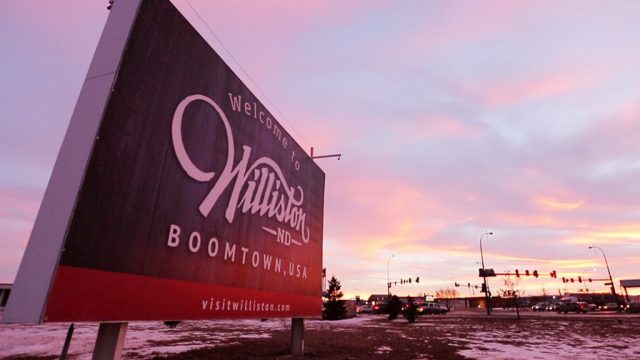Dear Williston: You Can't Make Them Love You

The Los Angeles Times today has a story (with contributions from former Williston Herald reporter Eric Killelea) about how Williston, North Dakota – which branded itself “Boomtown USA” during the Bakken oil boom – is handling the oil slowdown.
One question which should have been asked but apparently wasn’t is how city leader now feel about their “boomtown” branding. Booms, after all, imply busts. I suspect there has been some regret over that decision.
Overall it’s a good article, despite a curious positive allusion to that National Geographic show “Fracking Hell” which was revealed to have been faked to no small degree. But what caught my eye in the report was the description of the battle between Mayor Howard Klug and crew camp operators in and around the city.
Klug has taken up the cause of property developers, successfully winning a fight to shut down the crew camps (which provide shot-term housing options for oil industry workers) last year. You see, the people who invested in building hotels and homes and apartments in Williston don’t want to compete with the crew camps now that demand for housing in the city has fallen off a cliff, and they’ve got a majority on the city commission doing their dirty work for them.
“It’s very difficult to build a sustainable community on man camps,” former mayor Ward Koeser told the Times. Klug and other city leaders defended closing down the crew camps:
“When we started this thing, we had a tent city in our park,” said Mayor Howard Klug, recalling the beginning of the boom. “We got rid of that. Then they moved to the streets and camped. We got them out of there. Then they moved into people’s backyards. We got them out of there.”
“Then we had the man camps situation,” he said. …
The industry has helped build some apartment complexes, and it pays to rent some apartments on behalf of its workers. But the mayor said it needed to do more — that the town he grew up in was not just another oil patch.
“I think they could tweak their business plan a little bit so their employees could become permanent residents here,” Klug said.
At a city council meeting in November, Klug was on the winning side of a 3-2 vote on mandating that the camps close by July. The council agreed it would meet this month to consider allowing some camps to remain until later in the summer.
Koeser, Klug and others backing the city’s regulatory attacks on crew camps are utterly disconnected from reality. These are likely the same geniuses who thought branding their city as a “boomtown” was a good idea, and now they think that they can get people to stay in their city if the oil industry just does a “tweak” to their business plan, as Klug puts it.
This is madness. While I hope the people who came to North Dakota during the oil boom can continue to find prosperity and happiness here even with oil prices in the tank, the idea that we can get them to stay by attacking crew camp operators on behalf of property developers is kind of stupid.
[mks_pullquote align=”right” width=”300″ size=”24″ bg_color=”#ffffff” txt_color=”#000000″]…they cannot force people to stay in Williston by tying them to long-term housing commitments.[/mks_pullquote]
The influx of population into communities like Williston was all about opportunity. They came for the jobs, to put it simply. And when the opportunities dry up, those people are going to move on. Forcing those people to tie themselves to an apartment lease or, worse, a mortgage because more temporary housing arrangements aren’t available is not only against Williston’s long-term interests but is downright cruel.
And Klug comparing the crew camps to people pitching tents in the city parks, or in people’s back yards, is unfair to the point of being dishonest. The crew camps provide quality housing services to meet real demand for them. The camps often have entertainment centers, gyms, and workout areas. They also police themselves well, with strict rules about parties and drugs/alcohol. What’s more, the camps have to put up a bond ensuring that they will remove their structures from the properties they built on once they close.
I get that Williston doesn’t want to go back to the pre-oil boom status quo. I get that finding a way to keep their community attractive to people even after some of the oil industry opportunities have dried up is important. But they cannot force people to stay in Williston by tying them to long-term housing commitments.
That some of Williston’s current leaders apparently think that is perhaps cause for Williston to find itself better leadership.




